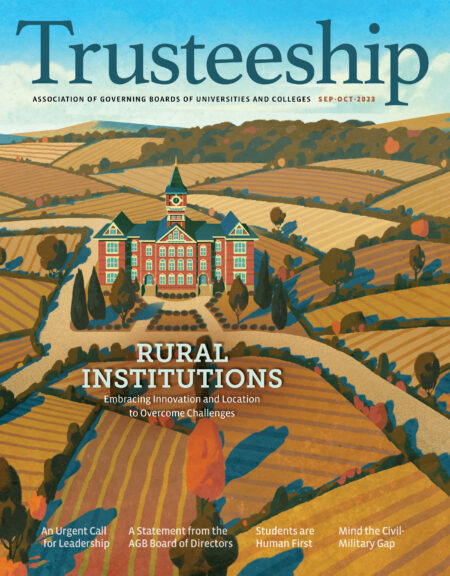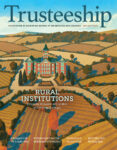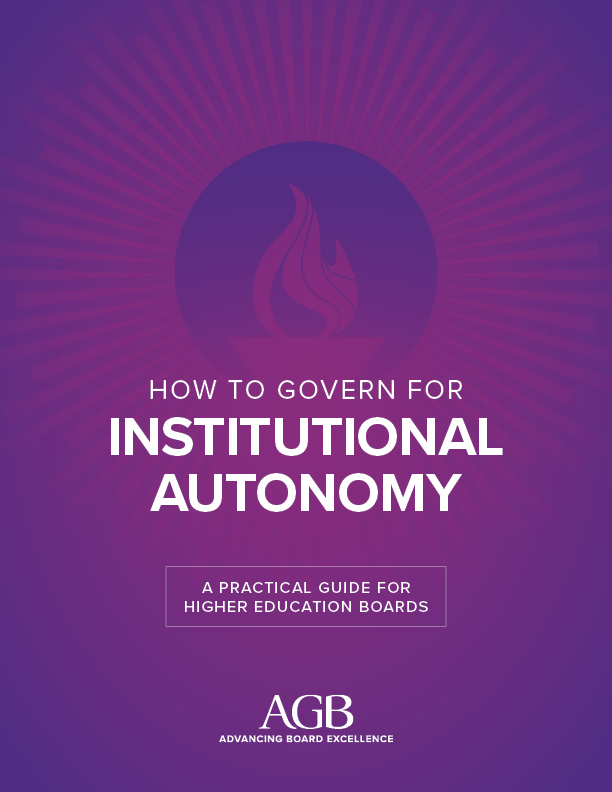
HIGHER EDUCATION AND DEMOCRACY are interdependent. Democracies need informed, creative, skilled, values-oriented, proactive citizens to engage with government and contribute to society. Higher education needs intellectual and creative freedom grounded in a search for truth, knowledge, individual development, and social benefit.

Federal officials and political leaders in multiple states are issuing mandates that limit what students can learn about and teach them what to think, not how to think. They are removing student financial assistance programs for lower-income and middle-income students. Already well-funded and gaining steam, these political intrusions on board governance authority rapidly expanded and accelerated in 2025 due to the newly elected federal administration’s unprecedented appropriation of powers.
Many of the new mandates are of questionable statuatory or constitutional basis, subject to court challenge. Their logical conclusion is the end of the higher education-federal partnership that has built the nation’s progress since at least the Morrill Act that established land-grant colleges in 1862.
Governing boards’ authority has not been so challenged since the Supreme Court upheld a board’s authority against intrusion by the state of New Hampshire (Dartmouth College v. Woodward, 1819).
Governing Board Responsibility
Each university, college, system, or supporting foundation governing board has fiduciary duty and authority defined in law to govern its organization. Its members are to hold the organization in trust for society, pursuing its best interests, addressing what it needs to fulfill its mission, exhibiting care, loyalty, and obedience. The duty applies to both short-term and long-term wellbeing, and it is all-encompassing, including but not limited to financial or conflict-of-interest issues.
The goal of fiduciary governance is not survival at any cost; it is fulfilling the organization’s mission. Boards need to understand, secure, and defend what the mission requires, including qualified faculty, safety, and free inquiry. Concessions and compromise may be appropriate to avoid or limit harm, but not if they become the first step on a slippery slope of losses or harm other institutions.
The stakes are historic. Democracy, the First Amendment, personal freedoms, and higher education itself are on the line. Every effort to prevent intrusions on board independence, institutional autonomy, free speech, and academic freedom is warranted, ideally to prevent the loss or at least to mitigate and slow the damage while legal challenges make their way through the justice system.
Freedom to learn is mission-critical in the United States. In authoritarian countries, the government ensures that all aspects of education are in line with the ideological wishes of whoever currently has political power. Loyalty to power is the litmus test for opportunity. People know what the head of state wants them to know; they believe and do what they are told to believe and do.
With citizen trustees, U.S. higher education is based on freedom of inquiry and expression driven by expertise, facts, research, and reasoning, not ideologies or partisan politics. Subject-matter experts determine the learning experiences of students, free of administrative or governmental control.
Universities and colleges have been able to operate freely in the context of a nation that was founded on replacing authoritarianism with government “of, by, and for the people.” The founders put government in the hands of popularly elected representatives. Civil society organizations, including education and religion, have their own independent governance arrangements, all of which provide for collective wisdom from diverse, caring people. Term limits prevent long-term accretion of power to one individual.
Systems are in place to hold boards and their institutions accountable. Postsecondary institutions are subject to federal, state, and accreditation authorities who have legitimate public purposes. These accountability, quality, and compliance requirements represent established public policy, not political ideology. They focus on standards, processes, and outcomes, not on academic and managerial decisions.
What is happening now is very different.
In early 2023, PEN America identified 25 bills in 15 state legislatures that challenged academic freedom, and the Chronicle of Higher Education counted 37 bills in 21 states to limit diversity, equity, and inclusion (DEI) programs. In another state, a single bill contained mandates on DEI, divisive concepts, intellectual diversity, China, mission statements, equal opportunity, strikes, post-tenure faculty reviews, faculty workloads, course syllabi, and graduation requirements.
Curriculum, academic content, standards, personnel policies, and management are the responsibility of trustees, executive leaders, and faculty, not politicians or government officials. Politicians advance their preferred ideology. Governing boards advance freedom and opportunity to learn. Only the latter is compatible with democracy.
The ideological intrusions to date fall into two general categories.
1) They prevent a college or university from fulfilling its mission.
Colleges and universities are for exploring oneself, others, and the world; for discovering new interests; and for coming to terms with being wrong or misguided sometimes.
Paying tuition is like buying a ticket to access professors’ expertise and skills. Censoring or directing academic content for ideological or political purposes destroys the value of the ticket and devalues the institution.
Ideological or political intrusions prevent students from expanding their minds and skills through informed discussion and debate: Professors avoid controversy, and students are not allowed to disagree. Colleges and universities are not allowed to do what they were created to do.
2) They prevent governing boards from fulfilling their fiduciary duties.
Accreditors require higher education institutions to have an independent governing board whose members are fiduciaries. Members are to hold the university or college in trust on behalf of society.
The board hires, evaluates, and supervises the president, who also acts as a fiduciary. The institution’s success depends on their mutual understanding and respect. Selecting, supervising, and replacing the president is the core function of most boards. In 2025, the president of the University of Virginia resigned due to federal government pressure. Whether the governing board was involved at all is not yet clear. What should have happened? Does it matter whether the president was a high performer or not? (He was.) What would you do as a board member?
Boards need a clear understanding of who has legal authority for what, both within and beyond the board itself. Boards must deal with any attempts to preempt decisions that belong to them.
Tipping Point for Freedom
Many quiet Americans are ready for positive change. With leadership and wise courage, history can record that Americans united and restored democracy, freedom, and uncensored learning to the nation.
Identifying and Dealing with Ideological Intrusions
Not all influence is intrusion. Intrusion is influence that undermines the best interests of the institution.
Questions that help differentiate the two:
- Does this proposal or requirement interfere with the institution’s ability to carry out its stated mission?
- Does it violate or compromise the governing board’s authority? Does it infringe on institutional autonomy?
- Does it limit academic or educational freedom, including opportunities to freely study, research, and express diverse ideas?
- Does it threaten or violate U.S. constitutional freedoms?
- Does it threaten the institution’s ability to maintain and improve success for all students?
- Does it violate accreditation requirements?
- Does it impose financial, reputational, or other burdens?
To deal with intrusion, preventive and nonconfrontational options such as education, evasion, and negotiation can be effective even for serious threats. However, board members should also be aware of more forceful options, including outright noncompliance or legal action. They need to decide together what lines, if crossed, would justify invoking an escalating series of opposing actions.
The governing board and president should prepare, build confidence, and earn trust in ways like this:
- Clearly understand the extent of the board’s roles, duties, and authority and that of other entities that can advance or harm the institution.
- Foster a strong, candid relationship between the board and the president, with explicit agreements on roles and expectations in the event of ideological or political intrusion.
- Plan ways to help maintain mutual understanding and agreement.
- Develop contingency plans such as a small task force with a clearly defined, board-approved charge and carefully selected members, and a robust internal and external communication plan.
- Stay informed about relevant incidents elsewhere and maintain connections with state, regional, and national sources of information, support, and inspiration.
- Build alliances with other postsecondary institutions and counterparts such as schools and libraries. Alliances can be bolder than individual entities.
- Governing boards with sunshine laws should address the fact that thoughtful and candid discussions almost always lead to better decisions and greater trust. The risk of being candid in public discussion might be far less than the risk of failing to halt a threatening intrusion.
- Governing board members could expand their relationships with community and state leaders or sponsor a public symposium series featuring thought leaders on higher education governance, academic freedom, and the democracy movement. Mobilize alumni and donors. Ask students to tell their stories in every setting.
United for Freedom
Standing up for freedom in higher education takes courage. It is risky for institutions and individuals. Governing board members need to deal with any misgivings they might have. Those who do not believe that their fiduciary duty is to advance the best interests of the institution over all else need to come to terms with their misunderstanding. Those who cannot risk potential personal consequences need to protect themselves without harming the institution, even if it means they must resign from the board.
Higher education and democracy owe a great debt to citizen trustees, all of them generous volunteers, who work hard to understand and fulfill their role. Thank you. We need even more from you now. The gravity of these challenges requires leaders who can work with each other to create a unified position and strategy that will keep independent governance in the hands of fiduciary citizen trustees and secure institutional autonomy, free expression, and academic freedom throughout the institution. How you proceed now, individually and collectively, will impact the course of history.
Today, governing boards are the ultimate line of defense to secure higher education as a critical force for democracy. How will your college or university contribute to the joy of the occasion, locally and nationally, on July 4, 2026?
Ellen-Earle Chaffee, PhD, was president of Valley City State University and served nine years simultaneously as president of Mayville State University. She then spent a term as president in residence at Harvard University. Earlier, she served as academic vice-chancellor for the North Dakota University System and director of organizational studies at the National Center for Higher Education Management Systems. She was president of the Association for Institutional Research and the Association for the Study of Higher Education, as well as the public member of the American Council on Pharmaceutical Education. She is a past member of Des Moines University’s board of trustees and served as board member and chair of a major health care system. Dr. Chaffee earned her master’s degree and PhD from Stanford University.


